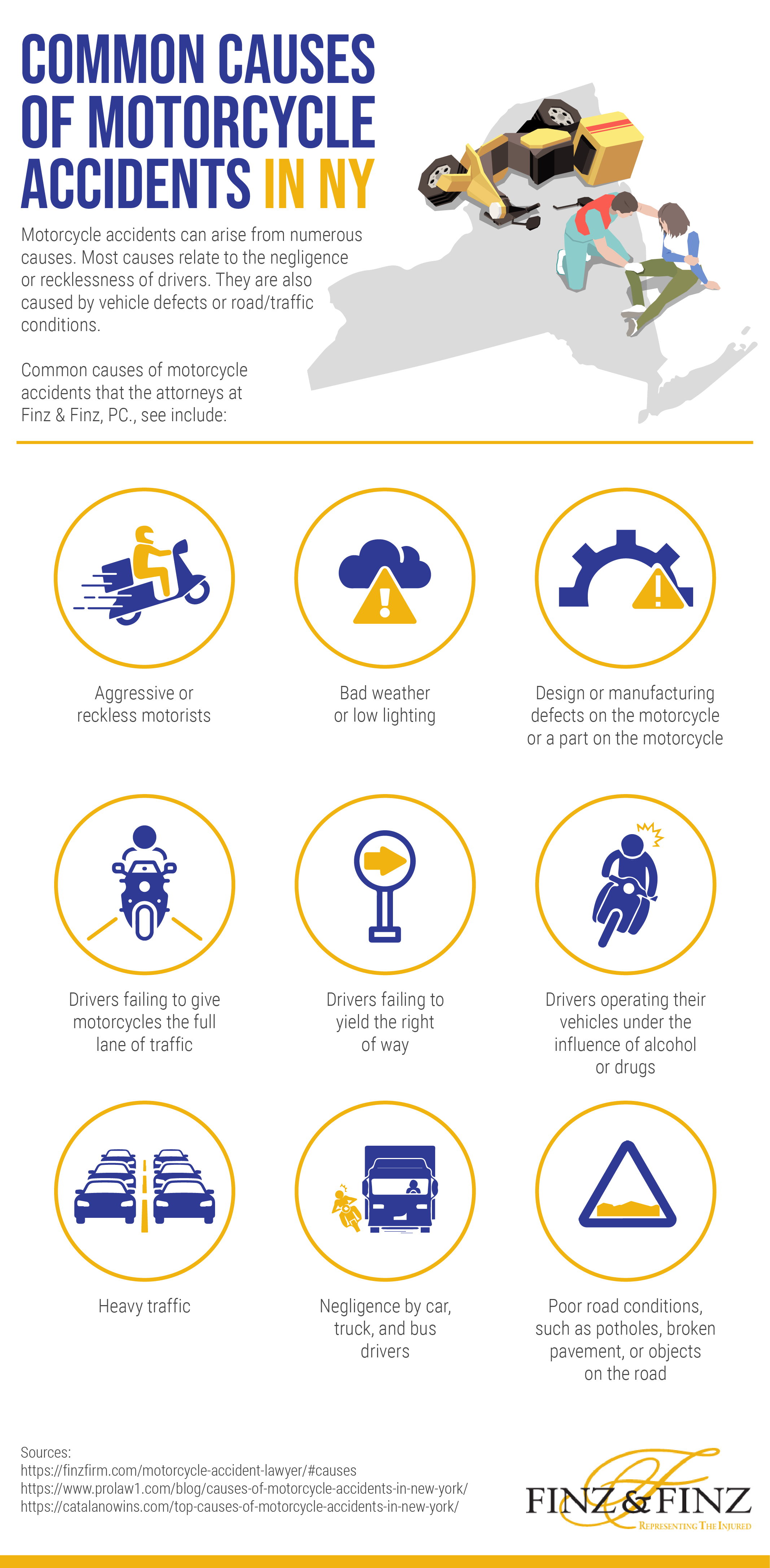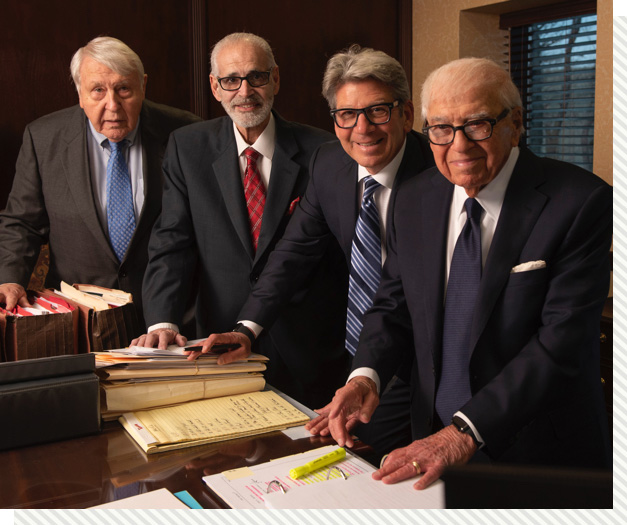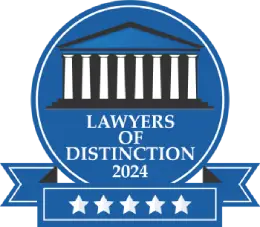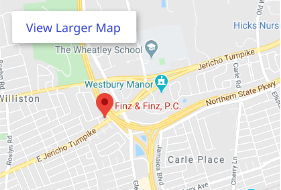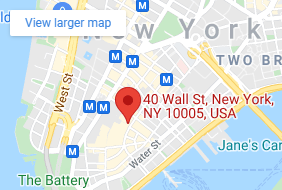New York City Motorcycle Accident Lawyer
Riding a motorcycle and enjoying the freedom of the open road can feel like pure happiness—until the unthinkable happens. In the blink of an eye, everything changes, and your life is no longer what it was before the motorcycle accident.
And you’re not just dealing with physical pain. You’re also facing emotional turmoil, mounting bills, and the need to handle legal matters just to get the compensation to which you are entitled to make your suffering less unbearable.
If this sounds like your situation, know this: you shouldn’t have to fight this battle alone. And you don’t have to.
At Finz & Finz, P.C., we’ve been standing up for injured motorcyclists like you for over 40 years. With a track record of winning over $1 billion for our clients, we’re not afraid to take on big insurance companies or stubborn defense lawyers. Founded by a former New York State Supreme Court Justice, our firm brings unmatched experience and a fierce commitment to maximizing your case’s value.
Ready to talk? Contact us today for a free case review—we’re here to listen and fight for you. Call at (212) 513-1000.
Why Choose Finz & Finz, P.C.?

At Finz & Finz, P.C., we’ve spent four decades building a reputation as a powerhouse in New York City personal injury law. Our founder, a former New York State Supreme Court Justice, set the tone for excellence, earning peer recognition as one of the “Preeminent Lawyers of America.” That legacy lives on in every case we take.
But what sets us apart?
- Proven results: We’ve secured over $1 billion for clients, including multiple record-setting verdicts and settlements that change lives.
- Experience you can trust: With 40+ years in the game, our hand-picked team includes four former judges and top-tier litigators who know the law inside and out.
- Compassion first: Our seasoned support staff is here to guide you with empathy and care every step of the way.
- No backing down: Judges, defense lawyers, and insurance companies know we fight hard and never settle for less than you deserve.
- Top ratings: We’ve earned the highest peer-reviewed honors for ethics and legal skills from Martindale-Hubbell.
Choosing a New York City motorcycle accident lawyer isn’t just about credentials—it’s about finding someone who’ll stand up for you when the odds feel stacked against you. And for injured motorcyclists, it’s a common situation they find themselves in.
Common Causes of Motorcycle Accidents in New York City
New York City’s roads can be a rider’s paradise. But they’re also full of risks. In our state, several factors commonly contribute to these devastating crashes:
- Distracted driving: Drivers texting, talking on the phone, or otherwise distracted are a leading cause of motorcycle accidents. Even a momentary lapse in attention can be fatal when a motorcycle is involved.
- Failure to yield right of way: Many accidents occur when cars or trucks fail to yield to motorcycles at intersections or when changing lanes. Drivers often claim they “didn’t see” the motorcycle—a statement that reveals negligence, not an excuse.
- Unsafe lane changes: Motorcycles can be in a driver’s blind spot, but it’s the driver’s responsibility to check thoroughly before changing lanes. Suddenly, changing lanes without using turn signals or checking blind spots often results in serious accidents.
- Speeding and reckless driving: Excessive speed decreases reaction time and increases the severity of impacts in a crash. This dangerous behavior by any motorist puts motorcyclists at particular risk.
- Driving under the influence: Alcohol and drugs impair judgment, coordination, and reaction time. Impaired driving continues to cause preventable motorcycle accidents throughout New York.
- Poor road conditions: Potholes, uneven pavement, debris, or inadequate signage can be merely inconvenient for car drivers but deadly hazards for motorcyclists.
- Dooring accidents: When a parked car’s door opens suddenly in a motorcyclist’s path, the rider may have no time to react.
- Auto defects and mechanical failures: Defective motorcycle parts or improper maintenance can lead to accidents.
Not sure what caused your crash or who’s to blame? A motorcycle accident lawyer in New York City from Finz & Finz, P.C. will thoroughly investigate your crash to identify all contributing factors and all potentially liable parties.
Common Motorcycle Accident Injuries

Statistics provided by the National Safety Council (NSC) indicate that over 80,000 motorcyclists sustain injuries in motor vehicle accidents across the U.S. annually. Motorcyclists are more likely than other road users to suffer devastating and life-threatening injuries. Why? Because motorcycle riders don’t have the steel cage of a car to shield them. When an accident happens, the impact hits hard. Some of the common injuries among motorcyclists include:
- Traumatic brain injuries (TBI): According to the Insurance Information Institute (III), approximately 74 percent of motorcyclists in the U.S. wear a helmet when riding. However, even with a helmet, the brain can suffer severe damage in a motorcycle crash. TBIs can range from concussions to severe brain damage, potentially causing permanent cognitive impairment, personality changes, and disability.
- Spinal cord injuries: Damage to the spinal cord can result in partial or complete paralysis. These catastrophic injuries typically require lifelong care and adaptive equipment.
- Road rash: When a rider slides across the pavement, the resulting friction burns can remove layers of skin. Severe road rash may require skin grafts, leading to serious infections or permanent scarring.
- Bone fractures: The impact in motorcycle accidents frequently causes broken bones, from simple fractures to complex breaks requiring surgical intervention. And multiple fractures are common in serious crashes.
- Soft tissue injuries: Damage to muscles, ligaments, and tendons can cause chronic pain and limited mobility, often requiring extensive physical therapy and rehabilitation.
- Internal injuries: Blunt force trauma can damage internal organs, causing internal bleeding that may be life-threatening if not treated promptly.
- Facial injuries: Facial fractures, dental injuries, and eye damage are common, especially when helmets without face protection are worn. These injuries often require reconstructive surgery and can cause permanent disfigurement.
- Amputations: In severe accidents, limbs may be severed during the crash or require surgical amputation afterward due to irreparable damage. These life-changing injuries necessitate prosthetics and extensive rehabilitation.
Every injury is unique, and everyone’s experience is different. Our motorcycle accident attorneys in New York City realize this, which is why we work with medical experts to fully understand the extent of clients’ injuries and their long-term impact. It makes us better positioned to demand fair and full compensation.
Who Is Liable When a Motorcycle Accident Happens?

(Gardiner Anderson/for New York Daily News)
After a crash, everyone points fingers. That’s completely normal. The driver says you were in their blind spot. The insurance company claims you were speeding. Figuring out who’s liable—legally at fault—can feel too daunting.
Multiple parties may share responsibility for your injuries in a motorcycle accident:
- Passenger vehicle drivers: Car and truck drivers who violate traffic laws or drive negligently are often liable for motorcycle crashes. Common violations include failure to yield, unsafe lane changes, distracted driving, and following too closely.
- Commercial vehicle operators and their employers: When commercial vehicles are involved, the driver and the company that employs them may be liable. Companies are responsible for hiring qualified drivers, maintaining their vehicles properly, and enforcing safety regulations.
- Government entities: State or local governments responsible for road design, maintenance, and signage may be liable if hazardous road conditions contributed to your accident. These claims involve special procedures and shorter filing deadlines (according to the Association of the Bar of the City of New York, you only have one year and 90 days instead of the standard two years to sue a municipality).
- Motorcycle manufacturers or repair shops: If a defective motorcycle part or improper repair contributed to the crash, the manufacturer or repair shop may be held responsible through a product liability claim.
- Property owners: Private property owners who create or fail to address hazardous conditions that lead to a motorcycle accident may be liable under premises liability laws.
Liability isn’t always clear-cut. That’s why our New York City motorcycle accident lawyers at Finz & Finz, P.C., investigate every angle—witnesses, traffic cams, police reports—to pin down who’s responsible. We don’t let excuses or shady tactics rob you of what’s yours.
Proving Negligence After a Motorcycle Accident
To secure compensation after an accident, you must generally prove that another party’s negligence caused your injuries. In the case of a motorcycle accident, “another party” is usually a car driver.
According to the American Bar Association (ABA), a person is considered “negligent” if they failed to act in a manner another reasonable person would. This legal concept hinges on four elements:
- Duty of care: Drivers owe you a duty to drive safely. Easy to prove—they’re on the road, they’re responsible. It’s not rocket science. It’s common sense.
- Breach: Did they break that duty? Speeding through a red light, texting instead of watching the road, or swerving without a signal—all these count.
- Causation: We connect their breach to your crash with facts. If that distracted driver hadn’t been scrolling social media, you wouldn’t be in a hospital bed. We make that link crystal clear.
- Damages: Your injuries and losses seal the deal. Medical bills piling up, lost income because you can’t work, and the constant pain you’re enduring—it all matters, and we make sure it’s front and center of your compensation claim.
Proving negligence isn’t just about pointing fingers—it’s about evidence. Insurance companies often try to exploit bias against motorcyclists by suggesting that riders are inherently reckless. Our attorneys at Finz & Finz, P.C. combat this prejudice with facts, expert testimony, and compelling evidence that establishes the other party’s fault.
We Help You Get the Compensation You Deserve After a Motorcycle Accident in New York City
 You’re hurting, out of work, and staring at the bills you can’t pay. In your situation, compensation isn’t just money—it’s a way to get your life back. At Finz & Finz, P.C., we push for every penny you’re owed, never settling for less.
You’re hurting, out of work, and staring at the bills you can’t pay. In your situation, compensation isn’t just money—it’s a way to get your life back. At Finz & Finz, P.C., we push for every penny you’re owed, never settling for less.
First and foremost, compensation should cover your medical expenses. These include emergency room visits, surgeries, physical therapy, medications, and future doctor appointments if your injuries linger.
If you can’t work because of your injuries, we fight for every dollar you’re missing out on, whether a few weeks of pay or a permanent hit to your earning power. You shouldn’t lose your livelihood over someone else’s mistake.
There are also property damage costs. Whether your bike is totaled or needs major repairs, we’ll get the cash to fix or replace it, down to the custom paint job you loved.
In addition to these obvious monetary damages, we ensure that our clients receive the compensation they deserve for non-economic losses, such as pain and suffering. This category of damage covers all the tough stuff you’re experiencing—the sleepless nights, the constant ache, the fear every time you think about riding again.
As New York City motorcycle accident lawyers, we’ve seen firsthand how accidents can leave scars people can’t see. Those appear in the form of depression, anxiety, post-traumatic stress disorder (PTSD), and other forms of mental and psychological distress. We know that therapy or counseling costs money, which is why we fight to demand it’s covered so you can heal inside and out.
Insurance companies understand the potentially high value of motorcycle accident claims and will work aggressively to minimize your compensation. They may offer quick settlements that fall far short of what you truly need for long-term recovery. Never accept an offer without consulting a motorcycle accident attorney who can evaluate whether it fairly addresses all your damages.
At Finz & Finz, P.C., we’ve recovered over $1 billion for injured clients. Our experience and resources allow us to accurately calculate the full value of your claim, including complicated projections of future medical needs and lost earnings.
Call the New York City Motorcycle Accident Lawyer at Finz & Finz, P.C.
 Being in an accident is something no motorcycle rider is ever prepared for. Someone else’s negligence stole your peace, health, and maybe even your passion for riding. But here’s the thing—you don’t have to let it end there. Call the New York City Motorcycle Accident Lawyer at Finz & Finz, P.C., we’ve been picking up the pieces for riders like you for over 40 years.
Being in an accident is something no motorcycle rider is ever prepared for. Someone else’s negligence stole your peace, health, and maybe even your passion for riding. But here’s the thing—you don’t have to let it end there. Call the New York City Motorcycle Accident Lawyer at Finz & Finz, P.C., we’ve been picking up the pieces for riders like you for over 40 years.
Tell us your story, let us shoulder the load, and let us take it from here and get you the justice you deserve. Contact our office now for a free case evaluation. Call at (212) 513-1000 or visit us online to get started.


 The motorcycle wreck attorneys at Finz & Finz, P.C., we focus exclusively on personal injury law. We are committed to helping those who have been injured through no fault of their own and in need of medical treatment. We help them secure maximum compensation for serious and common motorcycle accident injuries and damages. For 40 years, we have litigated complex, serious injury claims on behalf of the residents of New York City. In that time, we’ve compiled a track record of success, securing record-setting six- and seven-figure settlements and verdicts.
The motorcycle wreck attorneys at Finz & Finz, P.C., we focus exclusively on personal injury law. We are committed to helping those who have been injured through no fault of their own and in need of medical treatment. We help them secure maximum compensation for serious and common motorcycle accident injuries and damages. For 40 years, we have litigated complex, serious injury claims on behalf of the residents of New York City. In that time, we’ve compiled a track record of success, securing record-setting six- and seven-figure settlements and verdicts. If you’ve been injured or suffered damages following a motorcycle crash in New York City, you have a limited period in which to file a lawsuit. This period is known as the statute of limitations. Under
If you’ve been injured or suffered damages following a motorcycle crash in New York City, you have a limited period in which to file a lawsuit. This period is known as the statute of limitations. Under 